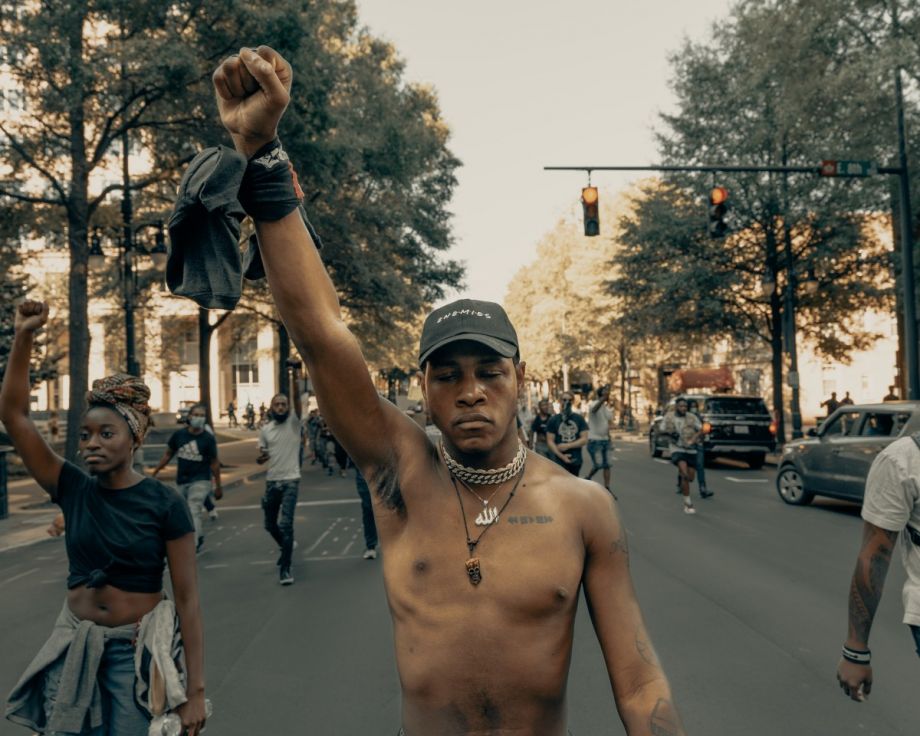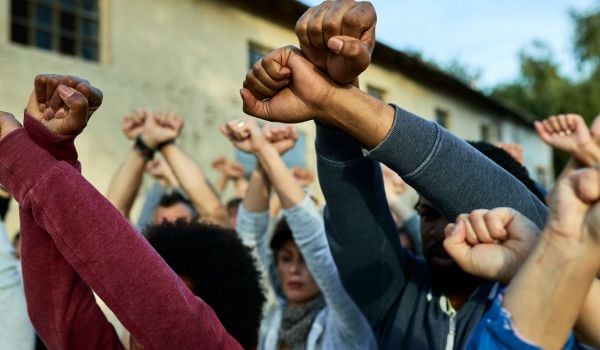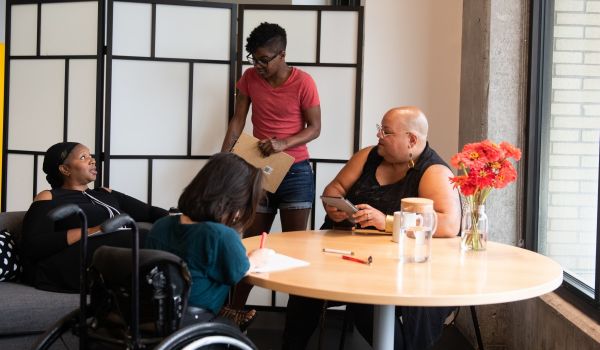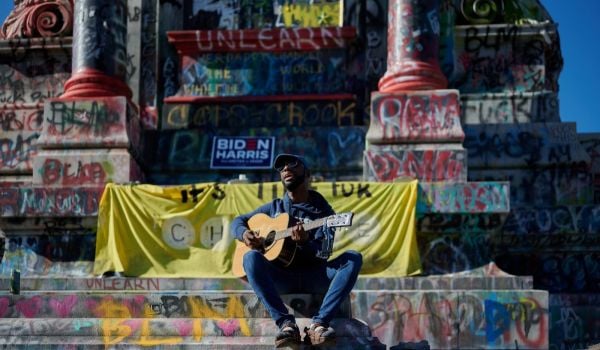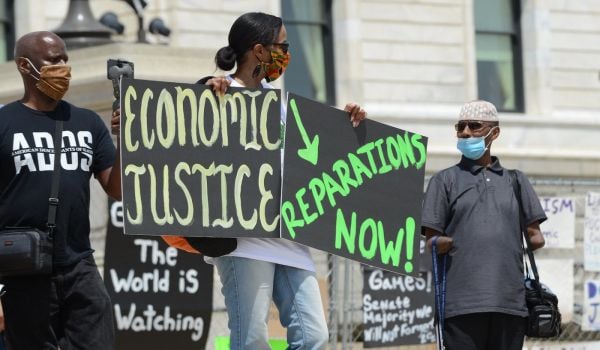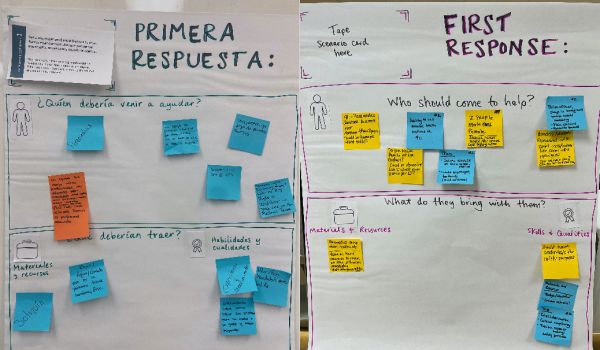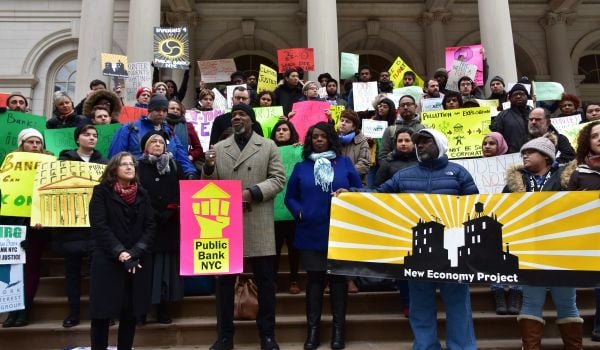EDITOR’S NOTE: “Hear Us” is a column series that features experts of color and their insights on issues related to the economy and racial justice. Follow us here and at #HearUs4Justice.
Here we are, nearly a year and a half post uprisings, and lawmakers have decided that social media and symbolic solidarity are all that was required to meet the moment. It would be too generous to say that the demands of Black organizers have been ignored. We know, in fact, that they have been either undermined and dismissed out of hand.

News came down on Wednesday, September 22, that “sweeping bi-partisan police reform” would not pass the Senate after months of negotiations. The George Floyd Justice in Policing Act of 2020 would ban chokeholds and no-knock warrants at the federal level, limit the transfer of military-grade weapons to local law enforcement, and require federal police officers to wear body cameras, among a host of other liberal police reforms. The bill would also give more money to police to establish “best practices and training requirements,” and it would increase cops’ ability to investigate themselves.
The bill was mediocre even by liberal standards and Democrats could not even deliver on their own mediocrity. Immediately, Sen. Tim Scott (R-SC) blamed the legislation’s failure on Democrats’ push to defund the police — a claim of political action that is verifiably untrue. To be clear, this policy was not an attempt to meet the current moment, it was an attempt to silence dissent. The carceral state is adaptive, reform will never be enough. This is why we support defunding as a path to abolition.
Rather than pass popular legislation and explicitly resist the facism overtaking the Republican Party and our collective democracy, Democrats have played the middle and allowed members of their own party to enact roadblocks that obstruct much-needed governing for the people who elected them.
Not only are they failing to deliver, but they’re also scapegoating — and gaslighting — the Black organizers who did deliver by handing them the presidency. In August, as part of a $3.4 trillion budget resolution, the US Senate unanimously voted through an amendment to punish localities for defunding the police. And every Senate Democrat joined with Josh Hawley (R-MO) — you know, the guy who gave a raised fist to white nationalists at the January 6 insurrection — to vote for an additional 100,000 police officers. Instead of protecting Black bodies, our elected officials are literally adding bodies to the system that brutalizes us.
From national, even global, protests to city council meetings, “Defund the police” is a common, expansive refrain and a simple demand. And though there is certainly federal funding that flows to state and local police departments, the foundation of this organizing is rooted at the local level using the frame of divest/invest.
It is no wonder that those in power — on both sides of the aisle — who are clinging to the status quo have been on a mission to cast the defund movement as out of touch and irrelevant when it is exactly the opposite. Leaders of color are displaying the tradition of inside/outside organizing and their understanding of how to navigate a political process that is designed to be confusing and limit participation. We understand committee assignments, we know procedures, and we’re drafting legislation. And this makes us a threat to the people, systems, and institutions that depend on our oppression.
Ultimately, defunding the police is a power demand. It is about shifting resources away from punitive systems and toward caring systems that provide for and restore our communities. Elected officials have spent the last 50-plus decades amassing economic and political power through negotiations with white supremacy and racial capitalism. Is it surprising that they don’t support those of us who seek to dismantle it?
It’s Past Time to Listen, and Deliver
While they kill bills that would lower drug prices, allow the eviction moratorium to expire, and offer no movement on the federal minimum wage increase, there is still a rush to point the finger at the left, particularly the Black left. There is a crushing cycle at play that demands that Black organizers pause their issue-based work to support candidates who, once elected, will either ignore our demands or undermine our experiences.
Cities working on measures to divest from police budgets, including Oakland, Milwaukee, Minneapolis, Chicago, and Pittsburgh, are all under the leadership of elected officials who identify as Democrats. As we’ve seen nationally, this has not stopped them from leaning into anti-Black, tough-on-crime policies.
Despite calls to defund the Chicago Police, for example, Chicago Mayor Lori Lightfoot has called for an increase in their budget. This is despite a community survey put out by her own office that shows that if given the ability to allocate funds, residents would choose to direct those public dollars to community services, public health, infrastructure, street sanitization, and libraries — all instead of funding the police. In 2020, the City of Oakland developed a Redefining Public Safety Task Force in response to a local demand to defund 50% of the Oakland Police Department’s budget. Not only was the police budget not reduced, but the city council approved the establishment of a new police academy (Oakland’s fifth) just days ago.
When we redefine public safety, we do so much more than restructure police departments or make small budget reallocations. We commit to the idea that the programs that keep our communities safe are those that heal, provide for, and restore — and not those that punish or incarcerate. Congressperson Cori Bush is attempting to do just this with her People’s Response Act legislation. And while it doesn’t divest from policing, it does invest directly into non-carceral community safety. In addition, the People’s Coalition for Safety and Freedom is attempting to undo the harm of the Violent Crime Control and Law Enforcement Act, commonly referred to as the 1994 Crime Bill. The coalition’s aim is to repeal the Crime Bill and replace it with a democratically written piece of legislation developed through People’s Movement Assembly processes, which provide collective action plans, governance, and infrastructure.
Redefining public safety is also about a broader power demand: we must reclaim our political system so that it listens to and works for us. To get to the new world that we envision, one of collective liberation, we must repair as we build. Divesting from harmful and punitive systems while investing in the things that we need to thrive is how we get there. So is supporting — and not dismantling — a pathway for Black organizers and other people of color to lead us.
Tracey Corder is the Campaign Director for Policing work at the Action Center on Race and the Economy (ACRE).

